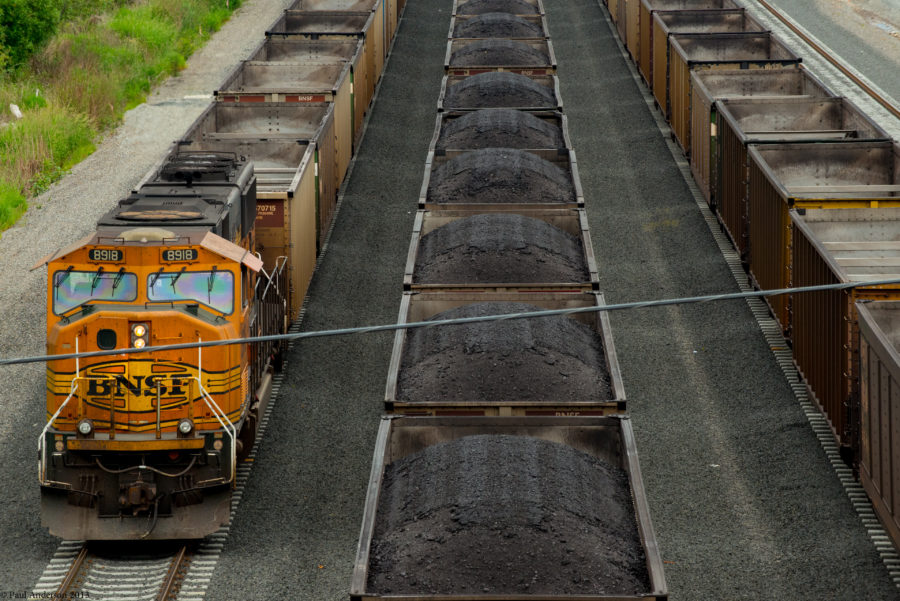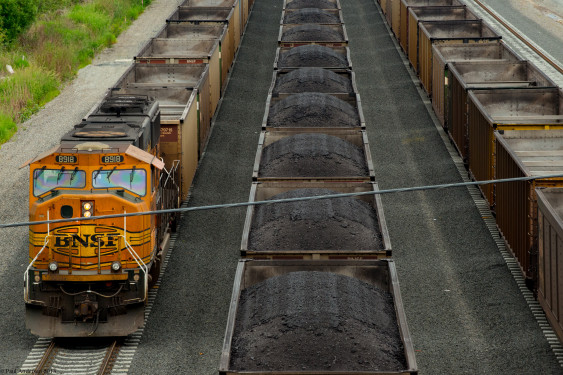Across the Northwest, Native communities are refusing to stand idle in the face of unprecedented schemes to move coal, oil, and gas through the region. It’s a movement that could well have consequences for global energy markets, and even the pace of climate change.
Now is a good moment for pausing to examine some of the seminal moments of resistance from tribal opposition to fossil fuel exports. Yesterday, the second Totem Pole Journey came to an end with a totem pole raising ceremony at the Beaver Lake Cree Nation in Alberta. As it did last year, the journey showcased the tremendous breadth and depth of indigenous opposition to coal and oil schemes—spanning Native communities from coastal forests to the high plains interior of North America.
The journey was a reminder not only of the particular moral authority of the tribes and First Nations in the face of fossil plans, but also the fact that they are uniquely equipped to arrest these export plans.
British Columbia
Like the United States, Canada is in the midst of a natural gas boom. The industry is trying desperately to move its products to foreign markets, but concerns about public health, fishing rights, and environmental damage have First Nations raising red flags.
Many of the First Nations in British Columbia have banded together against a liquid natural gas facility at Fort Nelson in northeast BC. At what is now being called the “Fort Nelson Incident” Chief Sharleen Gale gave a rousing speech, saying:
My elders said, you treat people kind, you treat people with respect… even when they are stabbing you in the back. So I respectfully ask government to please remove yourselves from the room.
Gale later asked LNG representatives to leave as well, and the event galvanized the BC aboriginal community. Since then, no fewer than 28 BC First Nation organizations have signed a declaration to put the facility on hold.
Elsewhere in the province, aboriginal communities have been in a long standoff with proponents of the highly controversial Enbridge Northern Gateway Pipeline, a proposal that would move tar sands oil from Alberta to port facilities in BC where it would be transferred to tankers that would move the crude to Pacific markets. At least 50 First Nation leaders and 130 organizations have signed the “Save the Fraser Declaration.” Citing concerns over water quality, fishing, treaty rights, and sovereignty, nine coastal First Nations even went so far as to preemptively ban oil tankers in their territorial waters.
The Canadian federal government gave approval to the Northern Gateway Pipeline in June, and women of the Gitga’at Nation did not take it lying down. In protest, they stretched a 4.5 kilometer (2.7 mile) crochet chain across the narrow channel near Kitimat, where the export facility is proposed to be built.
“It’s to show that we’re prepared to do what it takes to stop them because we can’t let it happen. It’s the death of our community, our culture,” said Lynne Hill, who generated the idea.
Now, similar opposition is mounting against Kinder Morgan’s planned Trans Mountain Pipeline expansion in southern BC, and BC First Nations are challenging it in court.
Lillian Sam, aboriginal elder from the Nak’al Koh River region, put the situation in perspective:
You cannot eat money…you see the devastation of the oil sands: a huge part of that land is no good. What’s going to happen to us? What’s going to happen to our children?
The US Northwest
Like their neighbors to the north, Washington Tribes have had major concerns over fossil fuel exports, not to mention the way they have been treated by proponents of the projects.
In 2011, the would-be builder of the Gateway Pacific coal terminal near Bellingham got into hot water with permitting agencies after it was discovered that they had begun construction without approval. Not only did construction crews destroy acres of sensitive wetlands, they also damaged local Lummi Nation burial grounds.
It was a not-so-subtle “accident” and was the last straw for many in the local tribal community. The Lummi subsequently burned a mock check from the terminal proponents at the site of the planned coal terminal. It was a pivotal moment for activism in the Northwest.
Opposition from the tribes can be a tremendous barrier for the coal, oil, and gas industries to surmount. Above and beyond their sovereignty, most of the Northwest tribes have specific fishing rights guaranteed to them in their treaties with the US government, rights that were subsequently reaffirmed and clarified by the Boldt Decision of 1974. Those tribes have firm legal footing for demanding access to their “usual and accustomed” fishing grounds, which include most of the places where fuel terminals would be located.
Other Puget Sound tribes have also made it publicly clear that they are firmly against coal exports. In April of last year, tribal leaders joined then-Seattle Mayor Mike McGinn in the Leadership Alliance, a coalition against coal export.
Said Tulalip Tribes Chairman Melvin Sheldon:
When it comes to coal… the negative potential of what it does to our Northwest—we stand with you to say no to coal. As a matter of fact, the Tulalip say ‘hell no’ to coal.
Brian Cladoosby, chairman of the Swinomish Indian Tribal Community and one of the state’s most influential Native American leaders, declared:
For thousands of years, Washington State tribes have fought to protect all that is important for those who call this great state home. We as leaders need to protect our treaty resources, our economies, and the human health of our citizens and neighbors.
The Nisqually Tribe likewise has submitted thorough public comment in opposition to a giant coal terminal planned for Longview, Washington. Beloved tribal leader Billy Frank, Jr., who recently passed away, was a persistent voice in opposition to Northwest fossil fuel exports. In one of the last things he wrote, he declared his solidarity with the Quinault Nation, who are fighting against a trio of oil terminals proposed in Grays Harbor Washington. Frank wrote:
The few jobs that the transport and export of coal and oil offer would come at the cost of catastrophic damage to our environment for years. Everyone knows that oil and water don’t mix, and neither do oil and fish, oil and wildlife, or oil and just about everything else. It’s not a matter of whether spills will happen, it’s a matter of when.
East of the Cascades, too, Native opposition has been fierce. The Yakama Tribe came out publicly and powerfully against Ambre’s proposed coal export facility in eastern Oregon, once again citing tribal fishing rights. Yakama protests and tenacity, in conjunction with other regional tribes like the Warm Springs and the Nez Perce, were a major factor in the proposal not being permitted. In Oregon, the Confederated Tribes of the Umatilla Indian Reservation also joined the Yakama in opposition to coal on the Columbia River, batting down ham-fisted attempts by the industry to buy tribal support.
Networks of tribes, like the Columbia River Intertribal Fish Commission (CRITFC), also voiced their strong concerns about what the proposals would be mean for their communities. The Northwest Indian Fisheries Commission also declared its strong opposition to oil exports from the proposed site at Grays Harbor, highlighting fishing disruption in the Puget Sound, health problems in their communities, and pollution.
In fact, the 57 nations that make up the Affiliated Tribes of Northwest Indians unanimously voted in May of 2013 to officially oppose all fossil fuel export facilities in the Northwest.
Paul Lumley, executive director of the Columbia River Intertribal Fish Commission, may have put the tribal community’s view most clearly:
Our communities are wedged between the railroad and the river. We’ve got nowhere to escape. If we cannot escape, neither will the coal.
Lumley’s words are proving prescient. Last month, yet another Northwest coal export terminal was dealt what was likely a fatal blow. The Oregon Department of State Lands denied a crucial permit to Ambre Energy, which plans to ship coal from a site on the Columbia River. Among the most influential factors the state agency cited for its decision: tribal sovereignty.
The decision was, in some ways, recognition of the power that the region’s tribes and First Nations can exercise over the fossil fuel infrastructure projects that are cropping up across the Northwest. By asserting treaty rights and voicing cultural concerns, tribes are presenting a major barrier—are a key part of the thin green line—to a reckless expansion of coal, oil, and gas schemes.











Mark
CRITFC = Columbia River Inter-Tribal Fish Commission, not “Fishing Council”.
Eric de Place
Doh! Thanks for the sharp eye. We fixed it.
David Moore
I hope the tribes have some clout but other laws require railroads to carry legal cargo. I guess these laws should be challenged and politicians should be forced to choose sides. Sell out and destroy nature or do whats right. Its ultimately a political question both local and national. Time to make noise.
Maureen Freehill
One valuable resource and consortium of Native guided action in our region is the newly formed Nawtsamaat Alliance (“One House, One Heart. United in Power to Protect the Sacred”). For more information on the 4 Days of Action to Protect the Salish Sea ~~ SEPT 16-22 please go to http://www.protectthesacred.org
http://www.protectthesacred.org
Chris Greacen
A huge heartfelt T H A N K Y O U to the First Nation people who are standing up, often at great personal risk, to stop these obscenities of greed and manic resource extraction capitalism.
Brothers & sisters, don’t sit on the sidelines on this one, our fate is being decided here.